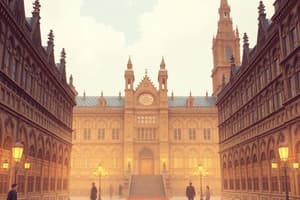Podcast
Questions and Answers
How are members of the House of Lords appointed?
How are members of the House of Lords appointed?
- By directly electing them
- By being nominated by the Queen
- By winning a general election
- By inheritance or appointment as life peers (correct)
What role does the Queen play in the legislative process?
What role does the Queen play in the legislative process?
- She is involved in setting the parliamentary agenda
- She must give assent before a law can become an Act of Parliament (correct)
- She has the final say in all laws
- She has the power to introduce laws
How often must a general election be held under the Fixed-Term Parliaments Act 2011?
How often must a general election be held under the Fixed-Term Parliaments Act 2011?
- Every four years
- Every six years
- Every three years
- Every five years (correct)
What is the purpose of a Green Paper in the legislative process?
What is the purpose of a Green Paper in the legislative process?
What types of individuals make up the House of Lords according to the text?
What types of individuals make up the House of Lords according to the text?
What is the purpose of sending comments to the relevant government department?
What is the purpose of sending comments to the relevant government department?
Who is responsible for initially drafting Bills in the UK?
Who is responsible for initially drafting Bills in the UK?
What is a key characteristic that a Bill must possess to become an Act of Parliament?
What is a key characteristic that a Bill must possess to become an Act of Parliament?
How are Private Members' Bills typically introduced in Parliament?
How are Private Members' Bills typically introduced in Parliament?
What distinguishes public Bills from private Bills in the UK legislative process?
What distinguishes public Bills from private Bills in the UK legislative process?
Flashcards are hidden until you start studying
Study Notes
The UK Parliament Structure
- Consists of the House of Commons, the House of Lords, and the Queen
- Members of the House of Commons are elected by the public
- Members of the House of Lords are either hereditary peers or appointed life peers
- The Queen gives her assent before a law can become an Act of Parliament
House of Commons
- Members of Parliament (MPs) sit in the House of Commons
- MPs represent a political party and are elected by the public
- The country is divided into constituencies, with each returning one MP
- General elections are held every five years under the Fixed-Term Parliaments Act 2011
House of Lords
- Consists of up to 92 hereditary peers
- Includes around 660 life peers, nominated by the prime minister
- Also includes the 26 most senior bishops in the Church of England
The Pre-Legislative Process
- Green Papers: consultative documents issued by the government to propose law reforms
- Interested parties are invited to comment on Green Papers
- White Papers: firm proposals for new law, taking into account views received during the Green Paper consultation
Bills
- Majority of Acts of Parliament are introduced by the government
- Bills are drafted by lawyers in the civil service, known as Parliamentary Counsel to the Treasury
- A Bill must be drafted to represent the government's wishes, using correct legal wording
- Private Members' Bills can be sponsored by individual MPs
- Only a limited number of Private Members' Bills become law
Private Members' Bills
- Allow individual MPs to introduce a Bill to Parliament
- Few Private Members' Bills become law, but some notable examples include:
- Abortion Act 1967
- Marriage Act 1994
- Backbenchers can also introduce Bills through the 'ten-minute rule'
- Members of the House of Lords can also introduce Private Members' Bills
Public and Private Bills
- Public Bills: involve matters of public policy that affect the whole country or a large section of it
- Private Bills: do not involve matters of public policy
Studying That Suits You
Use AI to generate personalized quizzes and flashcards to suit your learning preferences.




